
 Author: Shanon Hunt
Author: Shanon Hunt
Narrators: Noah Michael Levine and Erin deWard
Length: 14 hours 7 minutes
Publisher: Narrow Ledge Publishing
Released: Oct. 21, 2019
Genre: Horror

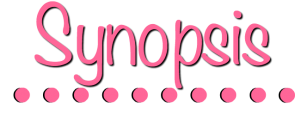
Six dead bodies with one disturbing similarity. An illicit genetic experiment. A secret society of true believers willing to do whatever it takes to become Pure. And this is only the beginning. DEA Special Agent Peter Malloy is no stranger to the devastating impact of drugs. So when six bodies turn up with surgical ports implanted in their spines, he’s sure a potent new opioid is the culprit. But when lab tests show zero evidence of any known narcotics, he fears something far more sinister. Allison Stevens thought she knew everything about her boss. But after he disappears, she’s stunned to discover his secret genetic research in pain tolerance. When she becomes the target of the FBI’s investigation, Allison has only one move. She must expose his illegal experiment. There’s just one problem. Some secrets will be protected at any cost. As Malloy and Allison get closer to the truth, they begin to realize they’re about to uncover the most chilling medical discovery in human history. If it doesn’t get them killed. The Pain Colony is a gripping suspense thriller–you’ll be plunged into terrifying twists of modern science, chilling tension, and shocking revelations that will leave you breathless. “A nail-biting page-turner you can’t put down!” –BookTrib “A shocking finale that even jaded readers won’t see coming!” –BookLife



 As a former pharmaceutical executive of 15 years, Shanon Hunt has firsthand experience with cutting edge medical advances. But it wasn’t until she took an interest in CRISPR and the near future implications of genetic engineering that she became inspired to write a suspense thriller.
When she’s not plotting her next story, she enjoys being tormented by her frisbee-obsessed Australian Shepherd, hiking the wilds of northern New Jersey, and canyoneering in southern Utah with her husband, Steve. She lives in suburban New Jersey with Steve and their two teenage sons, Nick and Ben.
As a former pharmaceutical executive of 15 years, Shanon Hunt has firsthand experience with cutting edge medical advances. But it wasn’t until she took an interest in CRISPR and the near future implications of genetic engineering that she became inspired to write a suspense thriller.
When she’s not plotting her next story, she enjoys being tormented by her frisbee-obsessed Australian Shepherd, hiking the wilds of northern New Jersey, and canyoneering in southern Utah with her husband, Steve. She lives in suburban New Jersey with Steve and their two teenage sons, Nick and Ben.
Website⎮Twitter⎮Facebook⎮Goodreads⎮Instagram
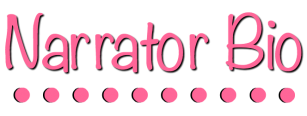
 Erin deWard is an Audie Award winning audiobook narrator and a classically trained stage actor. She is a long-time company member of The Strange Bedfellows, a Rockland County, NY based Shakespeare company and can be found directing, assisting another director, or on the lighting board for The Children’s Shakespeare Theatre in Rockland County, NY. She also directs English Language dubbing for IDC in New York. Erin has been working in the field of Audio Description (media accessibility for people who are blind) as a writer, voice talent, advocate, and trainer for over a decade. She is a proud and grateful member of SAG/AFTRA.
Erin deWard is an Audie Award winning audiobook narrator and a classically trained stage actor. She is a long-time company member of The Strange Bedfellows, a Rockland County, NY based Shakespeare company and can be found directing, assisting another director, or on the lighting board for The Children’s Shakespeare Theatre in Rockland County, NY. She also directs English Language dubbing for IDC in New York. Erin has been working in the field of Audio Description (media accessibility for people who are blind) as a writer, voice talent, advocate, and trainer for over a decade. She is a proud and grateful member of SAG/AFTRA.
Website⎮Twitter⎮Facebook⎮LinkedIn

 Family lore has it that, when I was three years old, my parents took my two older brothers and me on a vacation to Puerto Rico. At some point during the sojourn, my parents … well … they lost me on the beach. After searching, frantically, (Or not, as the case may be. I mean, they DID lose me in the first place.) they found me in the hotel bar, sitting on a hooker’s lap, telling a story to a sailor. And THAT is when my life in performance & yarn-spinning began.
The rest of my life has pretty much followed suit. Telling stories and becoming characters. I have over 40 years experience as a stage, film/TV actor and singer/songwriter/musician. And now, with over 325 audiobook titles, I’m so passionate about this industry – a medium that allows me to be immersed, for hours and hours, in wonderful characters and their tales. I’m grateful for the authors, narrators, & productions companies with which I work and so thankful for all the listeners!
Family lore has it that, when I was three years old, my parents took my two older brothers and me on a vacation to Puerto Rico. At some point during the sojourn, my parents … well … they lost me on the beach. After searching, frantically, (Or not, as the case may be. I mean, they DID lose me in the first place.) they found me in the hotel bar, sitting on a hooker’s lap, telling a story to a sailor. And THAT is when my life in performance & yarn-spinning began.
The rest of my life has pretty much followed suit. Telling stories and becoming characters. I have over 40 years experience as a stage, film/TV actor and singer/songwriter/musician. And now, with over 325 audiobook titles, I’m so passionate about this industry – a medium that allows me to be immersed, for hours and hours, in wonderful characters and their tales. I’m grateful for the authors, narrators, & productions companies with which I work and so thankful for all the listeners!
Website⎮Facebook
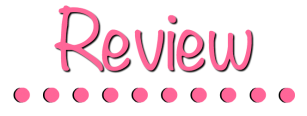 I received this audiobook as part of my participation in a blog tour with Audiobookworm Promotions. The tour is being sponsored by Shanon Hunt. The gifting of this audiobook did not affect my opinion of it.
I received this audiobook as part of my participation in a blog tour with Audiobookworm Promotions. The tour is being sponsored by Shanon Hunt. The gifting of this audiobook did not affect my opinion of it.

Q&A with Author Shanon Hunt
- How did you select your narrator?
- I found Erin simply by listening to voice after voice on the Audible samples. I had to hear a hundred before I found her, but she was perfect. Her vocal range was just what I needed for my frightened and emotionally frayed female main characters, and I loved the real drama she puts into her “woman in distress.” She’s an amazing actor. Her reading of Allison in the final chapters of the book still gives me chills! And when Erin brought Noah to the table, for the idea of dual recording, which I hadn’t considered, I was overjoyed! They have a wonderfully complementary style. Noah reads my hardened, cynical cop perfectly.
- How closely did you work with your narrator before and during the recording process? Did you give them any pronunciation tips or special insight into the characters?
- Since this story is a science/medical thriller, we did talk about the science. While I tried to avoid jargon in my exposition sections, I had a bit in the dialogue, which is naturally how a scientist would talk about his work. So, I recorded pronunciations and we had some discussions about a scientist (especially a young, smart one) would talk about his/her work. For example, one of my scientists is a 21 year old PhD genius. He explains DNA and genetic editing with the same casualness as my own 20 year old might talk about a movie or a video game.
- How do you manage to avoid burn-out? What do you do to maintain your enthusiasm for writing?
- For me, it’s a momentum thing. It’s hard to get started, but once I’m about 30% into the story, and my characters have turned into real people in my mind, I tend to look forward to the next chapter. I don’t write an outline, so each new scene is also new to me, and I get excited to see what’s happening next, same as a reader would. And as the story starts to take form, I begin talking to my family about it (bringing my work home, so to speak), and talking about the characters as if they’re people I work with. “Layla’s in trouble, and I don’t know how to help her out of this bind…” The more real they become to me (and my poor suffering family) the more excited I get to writing the next scene.
- Are you an audiobook listener? What about the audiobook format appeals to you?
- Yes! I absolutely love audiobooks because I take a two hour hike with my dog every day. Sometimes I get so lost in the story, I get lost in the woods. More than once I’ve had to say to my dog, “Sydney, let’s go home,” to have her point us in the direction of where I parked the car.
- Is there a particular part of this story that you feel is more resonating in the audiobook performance than in the book format?
- The last 25% of the story gets really intense as the characters all come together at the Colony. As the race is on, the chapters become short and intense, moving quickly back and forth between the main characters. Listening to the story on audio, as the narrator changes quickly between Erin and Noah, is so dramatic! I think the audio format brings something extra to the story as it progresses to the climax.
- How did you celebrate after finishing this novel?
- Much to my surprise, finishing a novel isn’t quite so black-on-white. I had expected a big celebratory moment. But the story came together in pieces. I wrote the last chapter very early in the book. I never typed “The End.” And once the story was finished, I rewrote it. (I rewrote it four times in total, with feedback from my editor.) So, it was about six months in the “finishing” stage. I can’t say I ever felt a moment that was worthy of an “open the champagne” except perhaps the day the book was published. And even then I was such a nervous wreck, I couldn’t enjoy anything. 🙂
- What’s next for you?
- I’m currently writing the last chapters of the sequel to The Pain Colony, which includes three point of view characters: Nick Slater, an investigative journalist, Josie Finley, a nineteen year old pregnant woman living in a fundamentalist town, and of course….Layla, a leader within the Colony. I’m super excited to keep the Colony world alive!

Q&A with Narrators Erin Deward & Noah Michael Levine
- How did you wind up narrating audiobooks? Was it always your goal or was it something you stumbled into by chance?
- Erin: I have never wanted to be anything but an actor. My parents called me Sarah Heartburn. Ha! I’ve been acting on stage since I was 8 years old. I studied in New York City as a teenager, went to college to study acting (and choreography), and have been acting ever since. When I hit a certain age, and didn’t feel like there were a whole lot of parts for women in that range, I started thinking about other ways to use my skills. I started with audio description – writing and recording additional tracks that make visual images and media accessible to people who have low or no vision – and then started thinking about audiobooks.
- Noah: November 1st, 2012 … specifically, around 10:30am. It was a Thursday. It was sunny. Hurricane Sandy had just passed through my town of Nyack, NY, and I was without power (for what became 10 days). While I’ve been acting and performing most of my life. Never once, in all of that time, did the idea of being an audiobook narrator even crossed my mind. I, of course, knew about “books on tape,” but I never made the connection. I was sitting in a café charging my many electronic devices when a familiar face came into view. Gary – a guy I had known since my late teens. He was/is an audio engineer and was running the sessions when I was 18, recording for the first time with my band in 1980. So – back to the café … Gary and I are catching up. I tell him I recently moved back to NY from California. He asked me what I was up to. I had no idea. I’d only been home a few months and really didn’t know what my future held. He told me, in addition to all the music stuff he was continuing to do, he had been editing audiobooks for Audible for about 10 years. He knew my background and suggested I look into it. He gave me a contact name at Audible. I reached out, sent a demo. They gave me a book to do, to try me out … and I’ve never looked back. Over 325 books and counting … I look forward to the next 325. Yes – I TOTALLY stumbled into it.
- What type of training have you undergone?
- Erin: Before I ever auditioned for my first book, I took a one on one audiobook narration class with Eliza Foss, I did two multi-week group classes with Paul Ruben, and I listened to A LOT of books. So, in addition to my theater training, which includes all the usual suspects, I have trained with Eliza, Paul (on an on-going basis), Carol Monda, PJ Ochlan, Christina Rooney, and Jayme Mattler. I try to take at least one audiobook focused class per year.
- A lot of narrators seem to have a background in theatre. Is that something you think is essential to a successful narration career?
- Erin: I know there are people who will argue with me, but narrating is acting. Even when you are reading a non fiction title, it is acting. There are some authors who read their own books very successfully, but most do not and that’s because while they are intimately acquainted with the material, they are not acting it. A good oral storyteller is an actor, whether they see themselves as such or not. So, essential? Maybe not. Really a good idea? Definitely.
- Noah: I think a background in acting is super important for a successful narration career. Many people think of audiobook narration as, simply, “reading out loud.” But it’s far more involved than that. Of all the branches of the acting world, audiobook narration is, arguably, the most intimate. We are performing directly into the listeners’ ears. There’s are no visual aids. Aside from all of the technical aspects of recording a book, bringing a nuanced performance to that, very specific setting, requires training and experience. In the same moment, a narrator has to be thinking about character arcs, changes in character voices, pacing, intentions, the tone of the scene, how best to convey the emotions and actable moments with authenticity … and … try to keep the brain/eye/mouth coordination going smoothly. It’s a hell of a lot of fun – but it’s not just reading out loud. Having that background in acting is critical.
- How closely do you prefer to work with authors?
- Noah: When possible, I like to get an idea of how the author hears their characters in their head. While bringing my own interpretation to the material, the author’s viewpoint can be very helpful in finding the right voices.
- What are your favorite and least favorite parts of narrating an audiobook?
- Noah: A least favorite part of narrating has to do with editing. I’m sorry to say this, but there are a LOT of poorly edited books. Missing punctuation, missing words, sentences that don’t make sense … I think it’s a disservice to the hard work that the authors put in to tell their stories, that the same sense of import isn’t given to what happens after the first couple of drafts are written. As a narrator, it pulls me out of the scene – out of the moment, which we all try hard to stay IN. But when we have stop and figure out how to read a sentence, it definitely impedes the flow of things. A favorite part of narrating is when a scene … a chapter … a book, even a whole series … just … CLICKS. I mean – you’ve got that flow going … the character voices deeply engrained … you are SO, deeply steeped in the scene and the emotion and the intention that the mechanics are on autopilot and you can just … do it. When you feel completely connected to the material and the story, and you don’t have to THINK – you just … do. It’s an amazing feeling!
- What would you say are your strongest narration abilities?
- Noah: Hmm – I guess I would say – connecting with the emotional level of the characters and the story. Of course, that’s completely subjective. That’s one of the interesting things about narrating as opposed to reading. The listener, who may have read the book previously, and formed their own views of how the characters should sound, and react … as narrators … in a sense, we are forcing the listener to accept our interpretation of the material. But it’s my hope that I can offer a performance that resonates with the listener. Give them voices and characters that feel honest and believable. I love to work with accents and different voice styles. So, whether it’s doing a straight-forward American hero voice, or coming up with a Middle-Eastern/British hybrid – I hope to engage the listener in the world that the author has created.
- What bits of advice would you give to aspiring audiobook narrators?
- Erin: Listen to a lot of books. You wouldn’t believe the number of people who think they want to do this work but have never listened to a book. Take classes – first in basic acting and then audiobook specific. You will stink in the beginning. We all do. But we learn from doing and listening and studying. Grow a thick skin.
- Noah: Study. Train. Learn. This is a long-haul, not a sprint. Get yourself set-up for success in terms of recording space and equipment. Find out if certain genres work better for your skillset than others. Don’t take short cuts … do the work. Build relationships. Learn how to manage your time effectively – which can be very different from one person to the next. Take breaks. Breathe. Hydrate. If you’re stuck … head’s not in the game … Devil’s on your shoulder … stop. Take a walk. Come back with a fresh perspective. Respect the writing and the characters. Have fun. Give the listeners an experience they will enjoy.
- How does audiobook narration differ from other types of voiceover work you’ve done?
- Erin: I’m really bad at commercial voice work. Like seriously bad. I can’t find the rhythms that people who are good at it find. I can’t figure out where the emphasis should be. I get too stuck in my head. Audio description is lovely because you can match you tone to the tone of the media you are describing. It makes it really symbiotic and fun. English Language dubbing and Audiobooks are my favorite, though, because ACTING!
- Noah: It differs immensely. With the exception of documentary narration, most other voiceover work is short-form, and, typically, limited in scope in terms of the number of characters to be voiced. The average audiobook is, I believe, 7 or 8 hours. I’ve narrated some that were 20, 30 or more hours. Then there are series that, when combined, can be well over 80 hours of material. When you consider that it can take 1.5 to 3 hours to record 1 hour of material, that’s a LOT of time to spend with the characters and their stories. And unless you’re doing Duet or Full-Cast narration, you are responsible for every character in the book. One of the first series I did, very early in my career, was 18 books long, with over 500 characters. It can be a daunting, yet exciting challenge. You get to voice every aspect of the story. It’s pretty, freakin’ cool. And, for the most part, there’s no “Director,” other than yourself. So all that, mixed with the sheer mechanics of recording, software, mic technique, battling a gurgling stomach, trucks thundering down the road outside, and the joy of immersing yourself in the material – it’s a pretty unique experience, and far different from a 30-second commercial or half-hour cartoon.
- Do you read reviews for your audiobooks? If so, which ones stand out to you most, positive or negative?
- Erin: Golly, I try not to. But when I’ve done a book that I think I’ve done a particularly good job on, I do. I tell myself it’s important because if there is a pattern that multiple listeners are reacting to, it’s important to know it. But really I’m looking because I want people to love the work I’ve put my heart and soul into. And then: my heart gets broken. Because there will always be people who don’t like your work. And that’s part of being an artist of any kind. You put yourself out there because you are driven to do the work. And some people may like it and some people may love it and some people may loathe it. And the anonymity of internet reviews makes it really easy for people to be really really mean.
- What type of the review comments do you find most constructive?
- Erin: The kinds that specifically say what worked well for them or what didn’t work for them. Saying “I hate her voice. Who ever thought it was a good idea to give HER a mic” doesn’t help me learn what I could have done differently and it doesn’t tell other potential listeners what the problems with the narration were. Similarly, “I love Erin and Noah” doesn’t tell me what I did that worked. I have to guess.
- Any funny anecdotes from inside the recording studio?
- Noah: Erin deWard and I have done over 60 books together. She’s such a great acting partner. And we have SO much fun in the booth. Primarily, because we both mess up a lot along the way. But rather than my sharing anecdotes here … I’d recommend listening to our outtake reels. Got to: www.noahmichaellevine.com, click on the “Duet Narration” tab, and scroll down to the bottom of the page. Hopefully, you’ll get some chuckles. Warning though – some of the material contained therein may be considered R-rated, or even NC-17 or X. Listener caution is advised. 😉
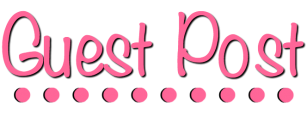
Shanon Hunt Shares a Fun fact about The Pain Colony Book Cover
As the book was going through its editorial reviews, I worked diligently on my author profile. I built a website, set up social media pages, all that publicity and marketing activities. Of course, they all request a photo, but I had a really bad profile picture, literally a capture of my head from a family photo. So I asked a friend/photographer, Catherine Babin, to do an author photo shoot. The photo shoot went was terrific. I took a dozen different “professional” photos, but I also wanted some photos of a colonist (a character type from the book) that I could use for marketing material. I bought white linen pants and a shirt, and took several photos in various creepy poses. Right about this time, my cover designer was looking for the perfect female colonist image to put on the cover, and we couldn’t find anything in stock photos. I considered some of my shots from the photo shoot, but none were right. I wanted a picture of my character Layla on the cover, and she’s much thinner than me. So, I bought a long blonde wig for $20, and ran back over to Catherine’s studio. She put on the white linen pants and shirt (we had to pin them behind her) and the wig, and her assistant took a dozen more poses. I selected the angry, clenched fist photo from that shoot, and now Catherine lives on as both the photographer and the model of The Pain Colony cover.
Prize: $50 Amazon Gift Card
The Pain Colony Giveaway: $50 Amazon Gift Card https://widget.gleamjs.io/e.js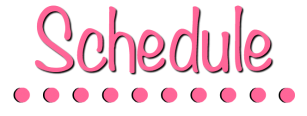 Dec. 5th:
Wall-to-Wall Books
Southern Girl Bookaholic
Reading A Page Turner
Dec. 6th:
Dab of Darkness Book Reviews
Cuzinlogic
Dec. 7th:
Nesie’s Place
The World As I See It
Dec. 8th:
All the Ups and Downs
Eileen Troemel
Dec. 9th:
Stressed Rach
4 the Love of Audiobooks
Dec. 10th:
Jazzy Book Reviews
Dec. 11th:
Locks, Hooks and Books
From the TBR Pile
Dec. 5th:
Wall-to-Wall Books
Southern Girl Bookaholic
Reading A Page Turner
Dec. 6th:
Dab of Darkness Book Reviews
Cuzinlogic
Dec. 7th:
Nesie’s Place
The World As I See It
Dec. 8th:
All the Ups and Downs
Eileen Troemel
Dec. 9th:
Stressed Rach
4 the Love of Audiobooks
Dec. 10th:
Jazzy Book Reviews
Dec. 11th:
Locks, Hooks and Books
From the TBR Pile
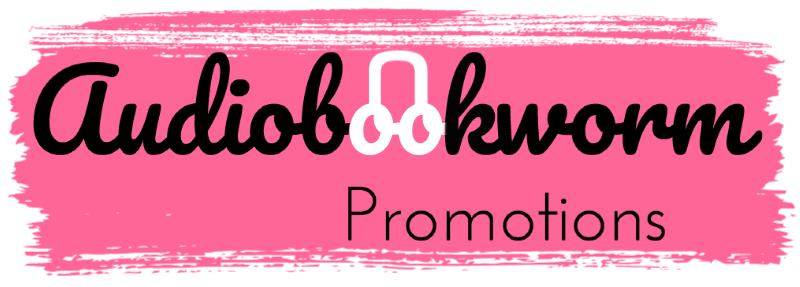
Plugging you into the audio community since 2016.
Sign up as a tour host here.
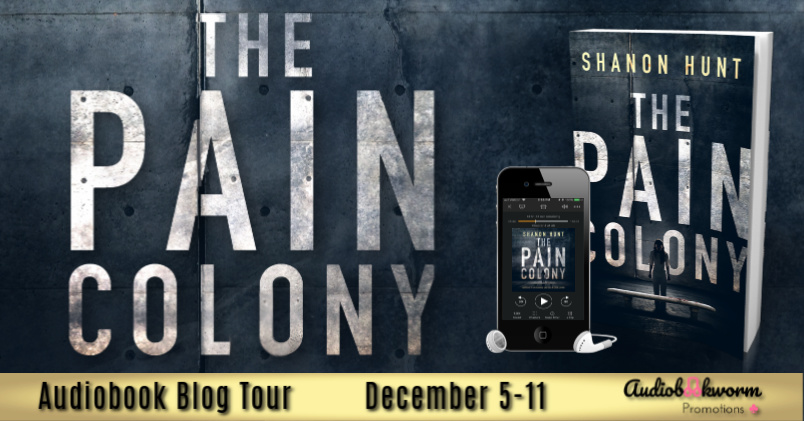
 Author: Shanon Hunt
Author: Shanon Hunt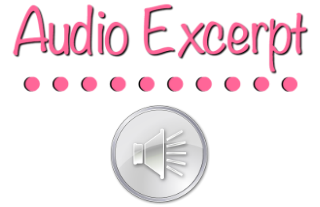
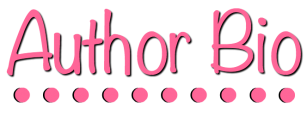
One thought on “The Pain Colony”